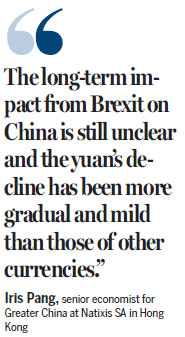Mild, orderly renminbi depreciation seen
Updated: 2016-06-28 07:29
By Lin Wenjie in Hong Kong(HK Edition)
|
|||||||||
|
A demonstrator holds a placard in protest against the UK's referendum vote to quit the European Union, outside the Houses of Parliament in London on Saturday. The impact of the UK's withdrawal from the trading bloc may help China secure a timely and orderly downward float of renminbi, which faces considerable depreciation pressure due to a stronger US dollar and a reviving US economy. Jason Alden / Bloomberg |
Economists rule out market panic as PBOC sets yuan fixing at 66-month low against greenback
As world financial markets move to calm the jitters and deal with the fallout from last week's shock British vote to abandon the European Union, economists have allayed fears that the contagion will dent the internationalization of renminbi, calling Monday's mild depreciation of the mainland currency a "new norm" for the near future.
With the British pound hitting a 30-year low against the US dollar, the People's Bank of China (PBOC) set the yuan fixing 0.9 percent weaker against the greenback on Monday at 6.6375 - the biggest intra-day downward move since August 2015, when the central bank closed the gap between the fixing and spot rates, and the lowest since December 2010.
In the wake of the Brexit referendum, the US dollar index had surged 1.9 percent last Friday - the biggest single-day gain since 2008 - according to Bloomberg.
Monday's decision by the PBOC came after the central bank vowed to keep the yuan stable with ample liquidity to maintain market confidence in response to the Brexit vote.
DBS economist Chris Leung Siu-kei believes that Brexit may benefit the country in the currency market, but its impact on Hong Kong is insignificant.
"World currencies, such as the South Korean won, the British pound and the Taiwan dollar, have all depreciated following the Brexit vote, providing enough room for the depreciation of the Chinese yuan. We don't need to worry about inducing market panic arising from depreciation this time," said Leung. "We believe that an orderly and mild depreciation of the yuan is likely to be seen in the near future."
"The yuan's mild depreciation will continue," said Iris Pang, senior economist for Greater China at Natixis SA in Hong Kong, predicting that the currency will decline to 6.8 a dollar by the end of this year.
"The long-term impact from Brexit on China is still unclear and the yuan's decline has been more gradual and mild than those of other currencies."

The impact on global financial markets is already showing and measures are needed to ensure stability in the international economy, Premier Li Keqiang told the World Economic Forum in Tianjin on Monday.
It's widely believed that, thanks to the impact of the UK's unexpected "Leave" vote, China is now able to secure a timely and orderly downward float of renminbi, which faces considerable depreciation pressure due to a stronger US dollar and a reviving US economy.
The latest data released by SWIFT (the Society for Worldwide Interbank Financial Telecommunication) showed that the UK currently accounts for 6.3 percent of all offshore transactions using yuan, with Singapore in third place at 4.6 percent, but the two countries are still lagging behind Hong Kong, which processes 72.5 percent of all payments in yuan.
DBS's projection for Hong Kong remains unchanged, with a 1 percent GDP growth for 2016 and 2 percent for next year.
Hong Kong's consumer price index is estimated to grow 2.6 percent in 2016 and 1.5 percent in 2017. "We don't think Brexit will have a big impact on Hong Kong's economy, but a contagion effect may take place," Leung said. "The future is unclear because we don't know which will be the next country to leave the European Union."
DBS economists believe that Britain's decision to quit the EU may weaken the UK's position as the second-largest offshore yuan center, with Singapore and New York catching up.
However, Hong Kong is likely to remain as the world's largest offshore yuan center for good, they say.
DBS economist Nathan Chow Hung-lai believes that Singapore will become the world's next second-largest offshore yuan center, and the US will step up its efforts to be among the top three, as clearing banks for settling yuan transactions will be soon be set up in the US.
Bloomberg contributed to the story.
cherrylin@chinadailyhk.com
(HK Edition 06/28/2016 page9)
